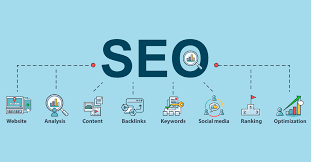In the ever-evolving world of online marketing, one role that has become increasingly crucial is that of an SEO developer. As businesses strive to improve their online visibility and attract more organic traffic, the expertise of an SEO developer has become invaluable.
So, what exactly does an SEO developer do? In simple terms, they are responsible for optimizing a website’s structure and code to ensure it is search engine-friendly. By implementing various techniques and strategies, an SEO developer helps websites rank higher in search engine results pages (SERPs) and ultimately drive more targeted traffic.
One of the primary tasks of an SEO developer is conducting comprehensive keyword research. By identifying relevant keywords and phrases that users are searching for, they can optimize a website’s content to align with these queries. This involves strategically placing keywords in titles, headings, meta tags, and throughout the content itself.
In addition to keyword optimization, an SEO developer focuses on improving a website’s technical aspects. This includes optimizing page load speed, ensuring proper indexing by search engines, creating XML sitemaps, and implementing structured data markup. By addressing these technical factors, they enhance a website’s crawlability and user experience while signaling its relevance to search engines.
Another vital aspect of an SEO developer’s role is link building. They work on acquiring high-quality backlinks from reputable websites within the same industry or niche. These backlinks act as “votes of confidence” for search engines and can significantly impact a website’s authority and rankings.
Furthermore, an SEO developer stays up-to-date with the latest algorithm changes implemented by search engines like Google. They continuously analyze data and monitor key performance indicators (KPIs) to identify areas for improvement and make necessary adjustments to maintain or improve rankings.
To excel in this role, an SEO developer must possess a combination of technical skills and marketing knowledge. Proficiency in HTML, CSS, JavaScript, and other programming languages is essential for optimizing website elements effectively. Additionally, a deep understanding of search engine algorithms, user behavior, and industry trends is crucial for developing effective SEO strategies.
In conclusion, an SEO developer plays a vital role in helping businesses achieve their online marketing goals. By optimizing websites for search engines and implementing effective strategies, they drive organic traffic and improve visibility. In today’s competitive digital landscape, having an experienced SEO developer on your team can make all the difference in reaching your target audience and staying ahead of the competition.
Six Essential SEO Strategies for Developers: Enhancing Performance, Keywords, Meta Tags, Header Structure, Backlinks, and Monitoring
- 1. Optimize website speed and performance to improve user experience and search engine rankings.
- 2. Conduct thorough keyword research to identify relevant keywords for your website’s content.
- 3. Create unique and compelling meta tags (title tags and meta descriptions) for each page of your website.
- 4. Implement proper header tags (H1, H2, etc.) to structure your content and help search engines understand its hierarchy.
- 5. Build high-quality backlinks from reputable websites to increase your website’s authority and visibility in search results.
- 6. Regularly monitor and analyze your website’s SEO performance using tools like Google Analytics or Search Console.
1. Optimize website speed and performance to improve user experience and search engine rankings.
One crucial tip for an SEO developer is to prioritize optimizing website speed and performance. This is because a fast-loading website not only enhances the user experience but also plays a significant role in improving search engine rankings. When a website loads quickly, visitors are more likely to stay engaged and explore its content, leading to lower bounce rates and increased user satisfaction. Moreover, search engines like Google consider page load speed as a ranking factor, as they prioritize delivering the best possible user experience. By focusing on improving website speed and performance, an SEO developer can ensure that both users and search engines have a positive impression of the site, ultimately driving better visibility and higher rankings.
2. Conduct thorough keyword research to identify relevant keywords for your website’s content.
One essential tip for an SEO developer is to conduct thorough keyword research to identify relevant keywords for your website’s content. Keyword research is the foundation of effective search engine optimization, as it helps you understand what terms and phrases your target audience is using when searching for products or services related to your business. By identifying these keywords, you can strategically incorporate them into your website’s content, including titles, headings, meta tags, and body text. This ensures that search engines recognize the relevance of your website to specific queries and increases the chances of ranking higher in search engine results pages (SERPs). By investing time in comprehensive keyword research, an SEO developer can significantly enhance a website’s visibility and attract more organic traffic.
3. Create unique and compelling meta tags (title tags and meta descriptions) for each page of your website.
Creating unique and compelling meta tags, including title tags and meta descriptions, for each page of your website is a crucial tip for SEO developers. Meta tags provide concise summaries of the content on a webpage and play a significant role in search engine rankings. By crafting unique and engaging meta tags for every page, you can effectively communicate the relevance and value of your content to both search engines and users. Compelling title tags can capture attention in search results, while well-written meta descriptions can entice users to click through to your website. Taking the time to optimize these meta tags can greatly improve your website’s visibility, click-through rates, and ultimately contribute to higher organic traffic.
4. Implement proper header tags (H1, H2, etc.) to structure your content and help search engines understand its hierarchy.
Implementing proper header tags, such as H1, H2, and so on, is a crucial tip for SEO developers. These header tags not only help structure the content on a website but also assist search engines in understanding its hierarchy. By using appropriate header tags, you can signal to search engines the importance and relevance of different sections of your content. This not only improves the user experience by making it easier for visitors to navigate through your website but also enhances its visibility in search engine results pages (SERPs). So, remember to utilize header tags effectively to optimize your content and improve its chances of ranking higher in search engine rankings.
5. Build high-quality backlinks from reputable websites to increase your website’s authority and visibility in search results.
Building high-quality backlinks from reputable websites is a crucial strategy for any SEO developer. By acquiring backlinks from authoritative sources within your industry, you can significantly enhance your website’s authority and visibility in search results. These backlinks act as endorsements, signaling to search engines that your website is trustworthy and relevant. As a result, search engines are more likely to rank your website higher in search results, leading to increased organic traffic and potential customers. So, invest time and effort in building strong relationships with reputable websites to secure valuable backlinks that will boost your website’s authority and improve its overall online presence.
6. Regularly monitor and analyze your website’s SEO performance using tools like Google Analytics or Search Console.
One essential tip for an SEO developer is to regularly monitor and analyze the performance of their website’s SEO using tools such as Google Analytics or Search Console. These tools provide valuable insights into various metrics, including organic traffic, keyword rankings, bounce rates, and user behavior. By consistently monitoring these metrics, an SEO developer can identify areas of improvement and make data-driven decisions to optimize their website further. This practice allows them to stay informed about the effectiveness of their SEO strategies and make necessary adjustments to maintain or improve their website’s search engine rankings.






